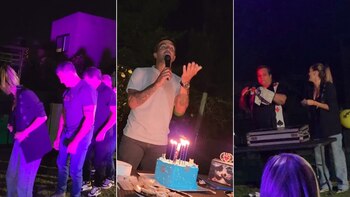
The Ministry of Health and Social Protection issued a series of recommendations on Tuesday to prevent acute respiratory infections in this rainy season. The entity emphasizes that precipitation can generate colds, flu and other more complicated diseases such as pneumonia, which are caused by respiratory viruses other than covid-19.
The Institute of Hydrology, Meteorology and Environmental Studies (IDEAM) reported that during April, May and June rainfall volumes are expected to be above historical averages. For that reason, the ministry invited Colombians to reinforce preventive measures during that period of time and follow the same recommendations for coronavirus:
- Maintain the use of masks indoors, especially in gardens, schools, geriatric centers.
- In the presence of any respiratory symptoms, you must wear the mask in open and closed spaces and must remain isolated avoiding infecting others.
- Frequent hand washing with soap and water, as well as cleaning and disinfection of spaces, remains essential.
- Avoid sudden changes in temperature, cover mouth and nose when moving to very cold spaces, keep children warm from cold and rain.
- If you have symptoms such as shortness of breath, fever higher than 38°C for more than two days, pain or rumbling in the chest or bloody yellow expectorations, you should be referred to the emergency room.
Recommendations for children and older adults
“During the rainy season, care and prevention measures must be strengthened, mainly for children under five years of age, adults over 60, people with a history of chronic lung diseases, with immunosuppression, and pregnant women,” said Iván Cárdenas, Deputy Director of Communicable Diseases at Ministry of Health.
The official explained that it is necessary to verify the vaccination and insurance status of children; intensify hand washing of minors and older adults; avoid contact with people who have the flu or cough; avoid the presence of smoke in the home, and facilitate ventilation, cleaning and lighting of the housing and gardens, keeping the spaces clean.
In the event that the minor or older adult has an acute respiratory infection, these are the recommendations:
- If possible, do not send it to the garden, school or school and reinforce hand washing.
- If body temperature is above 38.5 °C, treat fever with warm water cloths in areas with the highest concentration of heat (armpits and groin). Do not self-medicate.
- Increase the frequency of fluids and give food in small portions, more often.
- If you drink breast milk, give it more often. In turn, after meals, keep the child seated for at least 30 minutes.
- Provide you with the medicines that were formulated by the doctor, at the established doses and times and for the time indicated.
It may interest you: These are the recommendations of the Ministry of Health for Holy Week
When should I see a doctor?
The Ministry of Health stated that flu can generally be treated from home with the necessary care; however, if you have the following symptoms, you should see a doctor:
- For children under two months of age: It is important to seek a specialist if you notice faster than normal breathing; decreased appetite or fever, even in a single opportunity; if your chest whistles or you dream of breathing; if you are very sleepy or do not wake up easily, and if you have seizures or convulsions.
- For those older than two months: The alarming symptoms are fever of more than 38.5 °C for more than three days of difficult control; if you remain low when the fever goes down; breathing faster than normal; if your ribs sink when you breathe; if your chest whistles or sounds when you breathe; if you cannot eat or drink anything or vomit all; if you are very sleepy or not easily awake, and if you have seizures or seizures.
- At school age, adolescents and adults: A doctor should be sought in case of suffocation or difficulty breathing; chest pain when breathing or coughing; decay or excessive tiredness; fever greater than 38.5 °C of more than three days of difficult to control evolution, and if you have yellow or bloody sputum.
KEEP READING:
Últimas Noticias
Debanhi Escobar: they secured the motel where she was found lifeless in a cistern

The oldest person in the world died at the age of 119

Macabre find in CDMX: they left a body bagged and tied in a taxi
The eagles of America will face Manchester City in a duel of legends. Here are the details

Why is it good to bring dogs out to know the world when they are puppies




